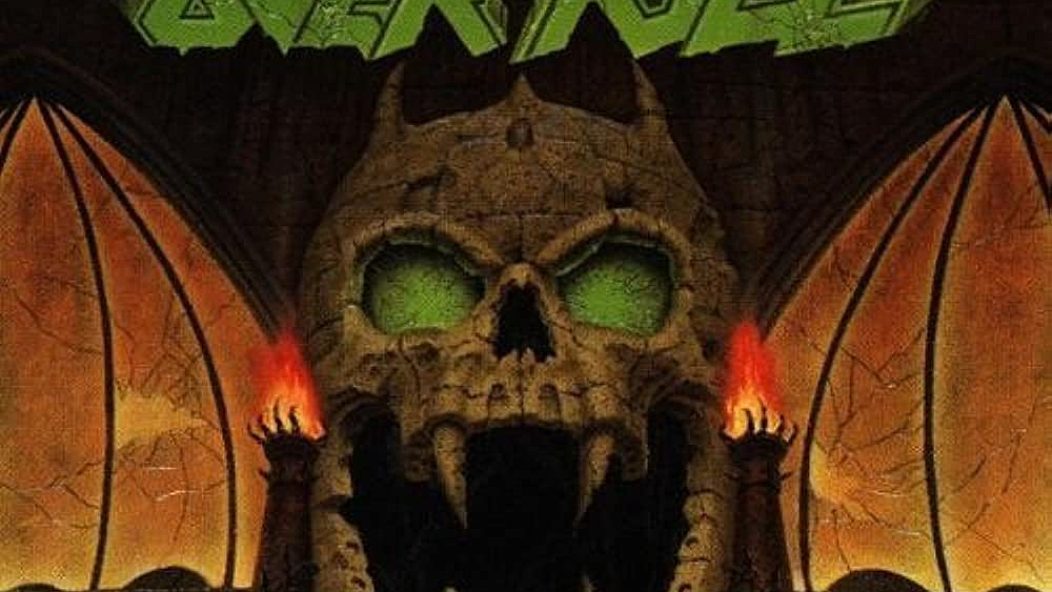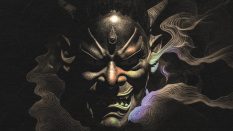
Jersey's Best (If Sometimes Cringey) Thrashers: Five Crucial Overkill Albums
Two things immediately become clear when you get into Overkill: (1) they’re from New Jersey, and they wear their love of their home state on their sleeves, and (2) they don’t give a fuck. Of the first point, opening with a song called “Welcome to the Garden State” with a Sopranos clip and closing it with the band singing Springsteen’s final moments of “Born to Run” tells you all you need to know. Of the second, well, just take a look at their (proudly) gaudy logo and their gleefully bad album covers.
Also, they have an EP called !!!Fuck You!!! with six exclamation points; apparently five didn’t get the message across. And then there’s the teenage-defiance lyricism of Bobby “Blitz” Ellsworth, the band’s longtime vocalist: “We don’t care what they say / We’ll be there tomorrow like we’re here today / And all the criticism in the world / Won’t change a note we play.” There’s a reason they’ve embraced their nickname, “the Motörhead of thrash.”
Thus, however you feel about Overkill’s brand of thrash metal and their, let’s say, spotty catalog, it hasn’t and doesn’t in any way impact the band or their output. To wit: they’ve put out 19 studio albums of original material since forming in 1980—note, however, that their debut LP, Feel the Fire, didn’t come out until ’85—with number 20, Scorched, due out in April. They’ve kept busy over the last four decades, in other words.
And Overkill’s catalog is a deeply fascinating one. They started out hot with albums of increasing quality throughout the ’80s featuring pummeling, riff-fueled thrash metal and typical (teenage) lyrical fanfare—war, evil/Satan, heavy metal, violence—before spending the 1990s and the 2000s experimenting with their sound, to (wildly) varying results. Sometimes it worked: 1997’s From the Underground and Below is their best record from that period—particularly Tim Mallare’s drumming—and is largely powered by dumb-fun songwriting and lyrics, featuring song titles like “F.U.C.T.” and “Little Bit o’ Murder.” But sometimes it didn’t work: 1993’s I Hear Black is a particularly tepid and stiff attempt at Pantera-aping groove metal, and 1999’s Necroshine sees them awkwardly shoehorn nu-metal (!) into their sound. Even their most dated album—1996’s The Killing Kind, with its Reservoir Dogs lyrical reference and a clip from Batman Returns—is worth checking out, if only to hear Ellsworth try harsh vocals. Yet, whatever the end result was, it was always compelling.
So: here are the five albums that represent the band’s catalog and its high points.
…
…
Taking Over | March 1987
Overkill’s sophomore album, Taking Over, is lightyears ahead of the middling but promising Feel the Fire, perhaps at least partially a result of the band spending more than a year on the road promoting the latter. The opening salvo of “Deny The Cross” and “Wrecking Crew” announce the improved confidence of Overkill’s classic lineup—Ellsworth, longtime bassist and primary songwriter Carlo “D.D.” Verni, guitarist and riff-writer Bobby Gustafson, and drummer Lee “Rat Skates” Kundrat (who’d leave after this record)—as both songwriters and musicians.
Indeed, that pair of songs is better than the entirety of their debut. Taking Over features stronger riffs, smarter leads, and (memorable) shout-along choruses. Ellsworth in particular takes his performances up a notch. His normal mode for early Overkill records was a theatrical one, heavily borrowing from Bruce Dickenson and Ronnie James Dio, et al. (He’d clutch that mode like a stuffed animal for a few more years—see below.) Here, though, he employs a ghoulish shriek-screech to highlight lyrics such as “Smash in your skull, kick out your brains / Dance all over, what remains?” And while there’s still unnecessary echo to his vocals, also carried over from Feel The Fire, it’s been rightly dialed back by co-producer and engineer (and the go-to guy for thrash metal in the ’80s) Alex Perialas.
But it’s the small stuff that truly demonstrates the band’s sharp eye for songwriting and arrangement this early in their career. The lead guitar in the middle third of “Fear His Name,” for example, travels between channels, mirroring the uncertainty of where the “avenger, midnight defender” will strike next. Similarly, on the mosh pit anthem “Electro-Violence,” the pauses between solos suggest the volley of punches being traded between moshers, and is followed by Ellsworth singing, “Take the shot, take the pain / Rebound, back again / Uncivilized reactions appeal to me / No restraints, face reality.” While sophomoric, Ellsworth’s lyricism here fits the excellent songwriting and displays a level of cohesion that most thrash bands didn’t have, or at least not on their second long-player.
Unfortunately, it’s that lyricism that mars Taking Over—specifically, the questionable and embarrassing sex-related lyrics. “Use Your Head,” for example, contains lines like, “Crack another beer, sit on over here / What I need I can’t do alone / Think that I’m in love sittin’ in your glove / What’s your name? Here I come out, I’m done.” Yikes. A generous reading is that this is satire of male chauvinism and/or encountering groupies on the road. That is not, however, a safe or even reasonable assumption for a band that have offered no indication of satire or parody to this point.
Even worse is “Fatal If Swallowed”: “You taste it, revolting, wishing you were dead / The effect: you’ll never grow old / Oozing slime foaming at the mouth—so dizzy! / The poison takes its toll.” That’s just gross for its own sake. Worse, it’s truly unfortunate: “Fatal If Swallowed” is the album’s highlight, almost seven minutes of excellent riffage (even if the chorus riff is eerily similar to the bridge riff of Metallica’s “Trapped Under Ice”). As Ellsworth gained confidence and matured as a vocalist and writer, he’d wisely abandon this kind of cringeworthy writing on later (and better) albums.
…
…
The Years of Decay | October 1989
Speaking of confidence: By 1989, Overkill were brimming with it, both as songwriters and musicians. Even while drummer Robert “Sid” Falck—who joined as Kundrat’s replacement, and made his studio debut on 1988’s Under the Influence—is a slightly inferior musician to his predecessor, the band were still as nimble as any in the heyday of thrash. As such, Overkill’s fourth LP, 1989’s The Years of Decay, is the band’s best-played and (mostly) best-written to this point. It features some of the band’s finest riffs and most interesting songwriting from this period. And since the band decided to lean into the progressive side of their compositions—which they’d spent side B of Under the Influence exploring—The Years of Decay was the band’s longest to date.
Hiring Terry Date seems to have, at least partially, inspired Overkill to reach for new heights. (Fittingly, Dimebag Darrell was himself inspired by The Years of Decay: according to Gustafson, Darrell heard Gustafson’s tone and wanted it for Cowboys from Hell, so he hired Date.) Date’s arid yet full production allows for a clean and clear recording, making this record (and the next) the band’s best-sounding until Colin Richardson’s work on From the Underground and Below. Date would later perfect that sound with Pantera’s genre-defining albums, Cowboys from Hell and Vulgar Display of Power, but The Years of Decay is where it started.
Which is excellent timing because the band’s playing was at a career high. After three records and years of touring, the Jersey quartet were locked in. The band skip and dance like gymnasts through “Nothing To Die For’”s neat twists and turns without breaking a sweat. Likewise, the exciting final minute of “Who Tends the Fire” sees the band speed up from mid-tempo to, ahem, overdrive like a supercar.
Then there’s “Birth of Tension,” easily the finest demonstration of how machine-precise they are here as they jump in and out of jackhammer rhythms as a unit without effort. And then there’s Ellsworth, who offered his then-best vocals. Having leaned into the mousey snarl he’s now known for (for better or worse) and slowly let go of his stolen theatricality over these four records (he wouldn’t give up his favorite stuffed animal until the next album),he’s really feeling himself here, especially on “E.vil N.ever D.ies,” where he’s as agile as the rest of the band.
Unfortunately, what Ellsworth is singing is (again) what mars The Years of Decay. He’d been writing like an edgelord teenager since their first record (e.g., “I have got a secret hidden behind my eyes / A violation tragedy of violence, hate, and lies”), and, sadly, it’s no different on this outing. What makes it worse this time is around is that he’s 30 when he sings stuff like, “Another game—rules, rules, rules / Not for me, you fucking fool / Open your mouth just one more time / And my foot’s going down.” Like, really? Often, his lyrics feel like first drafts found in a high school diary: “I have seen the fires burning / Burning through the night / I have watched the tides a-turning / And they go from dark to light.” It’s baffling that a grown man would write like that.
Yet more baffling—and easily the most bizarre lyrical choice on the entire album—is “Birth of Tension.” The song seems to be about the push-pull of life and how it takes a toll on you: “Too much tension all around / Too much tension, bring you down / All the pressures in the narrow mind / All the reasons you’ll never find.” OK, fine. It’s insipid and lazy, but not an issue. Then Ellsworth decides to employ some amateurish pop psychology to help explain and/or justify damaged people and their actions: “Did you kill your father, sleep with your mother? / Idolize your sister, were you jealous of your brother?” Then he adds, “Did ya kick the dog, were you beat with a strap? / Were you really abused? Were you faking all that?” Is that supposed to be edgy satire? (Again: Overkill weren’t and aren’t known for satire.) Is he being serious? Maybe it doesn’t matter.
Even when Ellsworth gets serious—like when he discusses his frustration with the AIDS epidemic on “Elimination”—it’s overshadowed by the perplexing lyrical choices made throughout. Yet, if you can get past Ellsworth’s writing, The Years of Decay is an otherwise outstanding, if a bit self-indulgent, album, both in Overkill’s catalog and in thrash metal in general; only one thrash band topped this in 1988. Overkill wouldn’t rest on that achievement for long, though.
…
…
Horrorscope | September 1991
By the time Overkill released its fifth full-length, 1991’s Horrorscope, they’d been a band for more than a decade. Notably, this record is the first without Gustafson, the band’s chief riff writer. He was replaced by two guitarists, Merritt Gant and Rob Cannavino, making Overkill a quintet for the first time.
Perhaps as a way to signal that they hadn’t lost a step or were a lesser band without Gustafson, every member plays with inspired tenacity. Falck’s playing is looser than on The Years of Decay, perhaps because an element of groove metal began to creep into the band’s songwriting—something they’d explore across the next nine albums, though 2007’s Immortalis—that required some feel. (It’s possible that Pantera, who’d been inspired by The Years of Decay to hire Terry Date, inspired Overkill to inject some southern boogie into their material.)
Similarly, Gant and Cannavino play and write like they’ve got something to prove—which is to say, that they’re not just replacements or hired guns. They fire off heavy riff after heavy riff and trade flashy firework solos like batons. Horrorscope, then, is the sound of a band having fun. It’s something that was lacking on The Years of Decay, an album whose negligible flaws echo those of …And Justice for All, the record it’s often compared to: too much of a good thing, a general lack of editing, and impressive but rote playing. Here, though, they’re loose, and they’re having a blast.
Which explains why there’s a cover of Edgar Winter Group’s “Frankenstein” on the album. Overkill’s version of the number-one single is a microcosm of Horrorscope: Their breezy playing suggests they don’t have a care in the world, despite losing a key member. Part of the fun is that the band dialed back the self-indulgence of their previous LP—Horrorscope averages 4.8 minutes per song, compared to The Years of Decay’s 6.2. Additionally, this marks the first time Overkill had more than nine songs on a full-length, perhaps signaling a desire or need to evolve.
Ellsworth might not have received that memo, though. As with their previous albums, Ellsworth’s lyrics continue to plague the band, and are the only real downside of Horrorscope. He’s still writing like a teenager, whether trying to be deep (“Open my eyes to what I need to see / Am I you, or am I becoming me?”) or trying to be edgy and/or cool (“I’m not dealing with you / No one here to thank / Fuck you, insecurity / Put that up your bank”). Ellsworth just doesn’t seem interested in personal growth or even just acting his age. It’s like a mutated, Gen-X teenager metalhead version of Peter Pan Syndrome.
Even the often-embarrassing song titles suggest immaturity (“Thanx for Nothin’”), a lack of interest in sophistication (“Live Young, Die Free,” “Nice Day… for a Funeral”), and groan-inducing puns (the title track, “Soulitude”). Furthermore, he throws out vague, impotent frustration that has little meaning: “I adapt to nothing, and nothing pleases me / I’m a loaded pistol, just you wait and see.” To his credit, Ellsworth does offer some age-appropriate lyricism when he discusses religion on the title track: “Words laced with blasphemy / Drip with sincerity / Falling into the plan / Like sacrificial lambs.” He even gets a bit poetic (relatively speaking) on the same song: “Made us what we are today / A lonely pile of disarray.” Those are the exceptions, though.
Ellsworth’s lyricism, then, kind of wastes his excellent vocals. It’s here that he fully leans into the mosey snarl that he’s known for. Here, his performances no longer feel like an imitation or caricature, as he finally overcomes his decade-long identity crisis and emerges as his own vocalist. When he snarls, “I’m a wartime killer,” it feels less like a threat than a promise, and you (almost) believe it. It’s a truly Herculean effort on his part to sell his questionable writing. But even in spite of poor lyricism, Horrorscope is still the premier and most fun album of Overkill’s classic era. It’d be a long time before they reach (and exceed) these heights again. The next two decades of Overkill would be a rough but often compelling one. A horrorscope, indeed.
…
…
Ironbound | January 2010
As discussed above, the period following Horrorscope that goes from I Hear Black through Immortalis was a series of growing pains for Overkill. Yet, credit’s due to their work ethic and continuing effort to try new things whether they worked or not. And they didn’t stop being themselves, instead showing a stiff upper lip—the lines, “You can take me outta hell / You can’t take the hell outta me” from Necroshine sum that up pretty well. And while their amusing covers album, 1999’s Coverkill, is worth a spin, the span of 1993-2007 is mostly interesting for unfortunate reasons.
Meanwhile, during the latter half of that period (the late 2000s), thrash metal was making a strong comeback and becoming fashionable again. Purely by coincidence, I’m sure, the old guard decided to make thrash metal albums that were worth hearing beyond morbid curiosity. Overkill decided they wanted to get in on the action, too. So after 18 years of trend-chasing experiments with groove metal and nu-metal to fluctuating returns, they reemerged as a true thrash metal band with their 15th album, 2010’s Ironbound.
The course correction back towards thrash—in other words, what they excelled at and where their best material comes from—started on the final third of 2003’s Killbox 13, where the band began to dip their toes back into the genre, but they wouldn’t fully commit to their first love until here. And Ironbound is a ripper of a record, one that rightfully received high praise upon release. One critic correctly stated that it finds Overkill “at the top of their game and only getting heavier.” Another called it “one of the greatest albums” in their catalog. It was compared to their ’80s records . And Exodus and ex-Slayer guitarist Gary Holt declared it “one of their best records ever.”
Ironbound is Overkill’s finest LP to this point, and it’s not even close. Because they embraced their one true muse—thrash metal—everything finally came together here: the riffs, the songwriting, and the playing. The latter is especially true of drummer Ron Lipnicki, a musician with a thrash background and the best drummer the band had through Ironbound. Additionally, he acted as a catalyst of inspiration, something Ellsworth confirmed in 2018. After showing much promise on his first outing with the band, Immortalis, he finally gets to show off his impressive skills here: The band lets loose for 57 minutes with no let-up. Pick any one song from Ironbound, and you’ll find better and more interesting drumming and arrangements than anything Mallare did, like Lipnicki’s triplet cymbal work on “Give A Little” or his double bass accents throughout the record.
Really, Ironbound is the sound of a band reborn. The eight-minute-riff-monster of an opener called “The Green and Black” seems written and placed to silence critics and fans who had dismissed or abandoned Overkill. The whole band sounds reinvigorated such that you’re forced to wonder how this same lineup made the mostly-tepid Immortalis. It’s as if they broke free of a sleepwalking spell. “The Green and Black” by itself is better than their entire output post-Horrorscope. Similarly, the chorus of “Endless War” is better songwriting than the majority of their catalog. Most of the record, though, follows “Bring Me the Night,” which sprints on gleefully fun riffing. And that’s the key word here and why Ironbound is so great—fun. It’s a word that’d been sorely missing from every Overkill album since at least From the Underground and Below.
And Ellsworth has as much fun as anyone in the band on Ironbound. Most of the thanks goes to his voice, which has only improved with age. Allowing gristle to develop over time has morphed his mousey snarl into an impressive banshee shriek. His histrionics on the title track alone demonstrate that he’s a better vocalist at this point than James or Dave or Tom. His voice got even better on later records, as his gristle-y shriek steadily inched closer to sounding tortured and/or possessed.
The same can’t be said of his lyricism, sadly. Despite being 50 during the Ironbound sessions, he’s still writing in nursery rhyme schemes (“Hey, maybe you just don’t care / You can’t get here and you can’t get there”) or just throwing out first drafts (“Now you got it, hold it like it means your life / Never going to let it go, grip it to the oh-so-tight”). Notably, religion seems to be one of the only muses that allows for (relatively) mature writing from him: “A lifelong list of Sundays wrapped up with a bow / Justifies the greatest answers you may never know.” He’s clearly a capable writer when he wants to be, so why can’t he do this more often? It’s truly frustrating.
Still, Ironbound is a milestone in thrash metal, and one of the genre’s best albums this century; no amount of poor lyricism can take away from that. More importantly, Overkill achieved something their peers haven’t in the last two decades: making a superb thrash album. And while they’d suffer a two-album hangover from this towering accomplishment, they weren’t done reaching new heights.
…
…
The Grinding Wheel | February 2017
So after two records that are essentially lesser versions of Ironbound, 2012’s The Electric Age and 2014’s White Devil Armory, Overkill went stratospheric with 2017’s The Grinding Wheel. Opener “Mean, Green, Killing Machine”—a spiritual sequel to Ironbound’s “The Green and Black” both in its impressive, multi-part arrangement and its fandom-call-to-arms lyricism—sees Ellsworth declare as much: “There comes the mean, green motherfucker blazing ’cross the sky.” It’s as good a description as any of this album’s content: a “tricked-out bullet train” of thrash that demonstrates that Ironbound wasn’t a one-off. No, The Grinding Wheel sees Overkill barrel ahead as quickly and as aggressively as they ever have. Ellsworth makes several references to this fuck-it-all speed: “Spitting gravel as I passed the cop,” “They drink gasoline from a dirty glass,” “Take a ride, take a look, take a chance now, baby,” “Let’s all ride ’til everyone is fried.”
But The Grinding Wheel isn’t just 60 minutes of galloping thrash—though, given the quality of the songwriting and musicianship, this would still be among their best records if it were. Here, the Jersey quintet drizzles some NWOBHM over “Our Finest Hour” and “The Long Road,” making for some of the band’s sharpest songwriting and soloing of their career. Meanwhile, “Come Heavy” is the closest they ever came to classic, Sabbath-esque metal, featuring a couple of the best riffs Tony Iommi never wrote. And then there’s the Southern boogie groove of “Shine On,” which features a middle third of shimmering clean guitar that brilliantly mirrors Ellseworth’s lyrics about losing himself in the rain. This is how you tinker with your sound without it feeling like trend-chasing or lost-in-the-woods experimentalism.
And while Ellsworth’s most comfortable in “fuck haters” defiance (e.g., “We’ve walked the long road a thousand times before / We’ve held our heads high and kicked right down the door”), there’s a bit of self-aware humor on The Grinding Wheel in the form of the Spinal Tap-esque “Let’s All Go to Hades.” A sing-songy thrasher, it’s the album’s catchiest song, with some of the silliest lyrics in Overkill’s history: “Let’s all go to gay Paris and lay a rose at the Bataclan / We’ll sing ‘Killed by Death’ as we stand arm in arm,” Ellsworth smirk-screeches, “Then we’ll head to Istanbul on the Orient Express / Wear your biker leather, you’re not overdressed.” It’s a refreshing, tongue-in-cheek acknowledgement of the band itself, and a welcome reprieve from the self-serious, angsty teenager stuff like “Stupid motherfucker getting under my skin / Running away with that mouth again / Got nothing better to do / SMF, let me shut that for you.”
The Grinding Wheel, then, is a career-best album, even surpassing Ironbound. It’s certainly an astonishing achievement for any band—especially a metal band—to hit a career high three-and-a-half decades into it. Somehow, though, the Jersey thrashers found a way to out-play and out-write their peers’ then-current full-lengths. As such, this record doubles as an excellent send-off for Lipnicki, who left shortly after its release. This was a blow to the band, as his playing on this album was the best of his career, and also the best of Overkill’s to this point. (He’d be replaced by Shadows Fall drummer Jason Bittner, whose playing on the follow-up, 2019’s The Wings of War, is now the yardstick by which to measure drumming in Overkill’s catalog.) At least he went out on top.
So, if there was any (more) proof required that Overkill don’t give up or give in, and instead continue reaching and hitting new peaks, “Last Man Standing” from The Wings of War will suffice. It’s the band’s best song this century, and among the best in their four-decade existence. And they made it without taking breaks or altering the core of who they were as a band. If you’re looking for an explanation for how that’s possible, perhaps a line from The Grinding Wheel offers some insight: “You took the higher road, I took the psychopath.” It’s a dumb pun, sure, but it’s also pretty goddamn accurate.
–Steve Lampiris
…
Overkill’s next album Scorched releases April 14th via Nuclear Blast.











